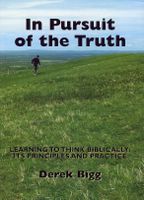Book review
For some decades now, reformed evangelical churches in the UK have been moving in the direction of what is called "biblical" theology. It is accepted that the name is not satisfactory; it implies that other forms of theology aren't biblical. The distinction that is made between systematic and biblical theology is that whereas the former seeks to present "a thematic arrangement of biblical truth in the form of basic Christian doctrine", the latter "traces the historical development of God's purposes from Genesis to Revelation." (p.7) Theology is something that we understand as God reveals it, rather than as humans arrange it.
There is no shortage of excellent literature that traces out the structure of biblical theology - from Geerhardus Vos' "Biblical Theology" through Graham Goldsworthy's books right up to Tim Chester's recently published "From Creation to New Creation." The problem up to now is that there has been little to tell us how this theological approach ought to be applied - how we should live in the light of God's unfolding revelation.
"In Pursuit of the Truth" is the first book that I have come across which seeks to correct this omission. The first, and shorter, part of the book is used by Derek Bigg to explain the basics of biblical theology. Although the books mentioned above do the same, the "principles of interpretation" that Derek uses to talk about God's unfolding plan were new and helpful. However, the real focus of Derek's book is the second part. This consists of a series of case studies, taking the principles that have been set out, and applying them to issues that face Christians. The areas which are investigated are: guidance; the role of the law and more specifically the ten commandments; and Christian attitudes to work and money. In many cases, the author argues, despite our stated commitment to sola scriptura,our behaviour as Christians has been shaped not so much by God's Word as by our culture, our traditions, at times even by the songs that we sing! Books that we read are often not informed by a consistent biblical theology, he argues, and he is not afraid to challenge inconsistency from respected teachers, where that is appropriate. So the conclusions that are drawn in this study are at times surprising and biblically radical.
I was entirely happy with these conclusions - though it ought to be said that this theological approach has had a direct impact on my Christian life for some years, so I am likely to be a willing reader! My only reservation about the book is that the helpful illustrations of how biblical theology works take on a life of their own in the book. It is hard to remember at times that the illustrations are derived from the Bible, rather than being ideas that are being imposed on the Bible by the author. This is an important distinction; if the illustrations are man-made, then they are just another way of looking at the text. If the illustrations are genuine reflections of the nature of the Bible (as I believe they are), then they are in a sense the correct way to look at the text.
In a post-script, the author is happy to acknowledge the provisional nature of his conclusions, and invite further discussion. He is raising these issues out of a desire to see ongoing reformation within the church. A growing seriousness about the content of God's Word and its impact on our lives and the lives of our churches is something that we all ought to be looking for. If the author's approach to interpreting the Bible is correct, then this book ought to have a major impact even within evangelical churches committed to the idea of ongoing reform, let alone in less Bible-based congregations. Whether this is so or not, the author's hope - and mine also, having read his book! - is that this book should be a starting point for further serious discussion about the impact of the Bible in the life of Christians.
The author has applied biblical theology to a limited number of areas of Christian life. It is natural to ask what would happen when the same principles are applied to other areas - the nature of the church; the nature of mission; baptism; church leadership; music. All sorts of areas of Christian life have the potential for reformation on the basis of a consistent understanding of God's communication with his people. I look forward to other books with the same theological foundation.
Review from "Beginning With Moses", previously published in "Evangelicals Now".
Labels: In Pursuit of the Truth


0 Comments:
Post a Comment
<< Home